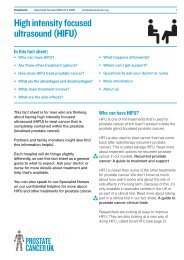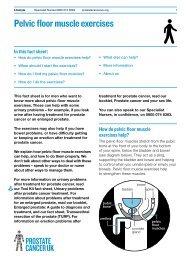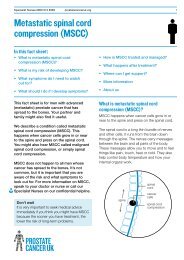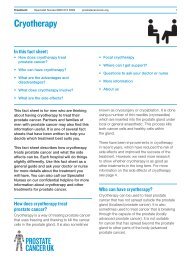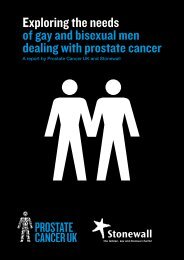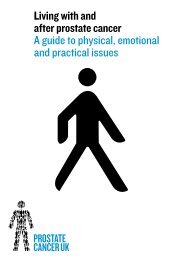Diet, activity and your risk of prostate cancer (pdf)
Diet, activity and your risk of prostate cancer (pdf)
Diet, activity and your risk of prostate cancer (pdf)
- No tags were found...
You also want an ePaper? Increase the reach of your titles
YUMPU automatically turns print PDFs into web optimized ePapers that Google loves.
<strong>Diet</strong>, <strong>activity</strong> <strong>and</strong> <strong>your</strong> <strong>risk</strong><strong>of</strong> <strong>prostate</strong> <strong>cancer</strong>
Prostate <strong>cancer</strong> is the most common <strong>cancer</strong> in menin the UK. About one in eight men (12.5 per cent)will get <strong>prostate</strong> <strong>cancer</strong> at some point in their lives.This leaflet is for all men who want to eat more healthily <strong>and</strong> possiblylower their <strong>risk</strong> <strong>of</strong> getting <strong>prostate</strong> <strong>cancer</strong>. If you have been diagnosedwith <strong>prostate</strong> <strong>cancer</strong>, you will find our Tool Kit fact sheet <strong>Diet</strong>, physical<strong>activity</strong> <strong>and</strong> <strong>prostate</strong> <strong>cancer</strong> more useful.Who is at <strong>risk</strong> <strong>of</strong> <strong>prostate</strong> <strong>cancer</strong>?You are more likely to get <strong>prostate</strong> <strong>cancer</strong> if:• you are aged 50 or over• <strong>your</strong> father or brother has been diagnosed with <strong>prostate</strong> <strong>cancer</strong>• you are <strong>of</strong> black Caribbean or black African descent.For more information, read our booklet Know <strong>your</strong> <strong>prostate</strong>: A guideto common <strong>prostate</strong> problems.Can I reduce my <strong>risk</strong> <strong>of</strong> <strong>prostate</strong> <strong>cancer</strong>?We don’t know how to prevent <strong>prostate</strong> <strong>cancer</strong>, but a healthy diet <strong>and</strong>lifestyle may be important. Eating healthily <strong>and</strong> being active can helpyou stay a healthy weight. This may mean that you are less likely tobe diagnosed with aggressive or advanced <strong>prostate</strong> <strong>cancer</strong>. A healthylifestyle can also improve <strong>your</strong> general wellbeing <strong>and</strong> reduce <strong>your</strong> <strong>risk</strong><strong>of</strong> other health problems such as diabetes, heart disease <strong>and</strong> someother <strong>cancer</strong>s.More men in Western countries get <strong>prostate</strong> <strong>cancer</strong> compared to menin East Asian countries such as China <strong>and</strong> Japan. But when men fromAsian countries move to Western countries they are as likely to get<strong>prostate</strong> <strong>cancer</strong> as Western men. This may be because <strong>of</strong> the Westerndiet, which contains less fruit, vegetables <strong>and</strong> fish, <strong>and</strong> more meat,dairy, sugar, fat <strong>and</strong> processed foods.
What is a healthy diet?Eating a healthy, balanced diet with a wide variety <strong>of</strong> foods <strong>and</strong>plenty <strong>of</strong> fruit <strong>and</strong> vegetables may help to lower <strong>your</strong> <strong>risk</strong> <strong>of</strong> <strong>prostate</strong><strong>cancer</strong>. A balanced diet should contain all the food groups in thepicture below so that <strong>your</strong> body has all the energy <strong>and</strong> nutrients itneeds, without containing too much fatty <strong>and</strong> sugary foods whichcan lead to weight gain.The picture shows the five main food groups <strong>and</strong> the proportions thatyou should try <strong>and</strong> eat every day.Starchy foods suchFruit <strong>and</strong>vegetables,eat at least five80g portions aday. These canbe fresh, frozen,tinned, driedor juiced.as rice, pasta, bread,potatoes, plantain, <strong>and</strong>sweet potato. Go forwholegrain options.Protein rich foodsinlcuding fish, eggs,beans, nuts, seeds<strong>and</strong> lean meat.Milk <strong>and</strong> dairyfoods, such asmilk, cheese<strong>and</strong> yoghurt.Limit foods <strong>and</strong> drinks high in fat, sugar <strong>and</strong> saltsuch as butter, cakes, biscuits, crisps <strong>and</strong> fizzy drinks.Some people like to take supplements to help prevent <strong>cancer</strong> but theevidence doesn’t show that they lower <strong>your</strong> <strong>risk</strong>. In fact, some mighteven increase it. If you do take supplements, don’t take more than therecommended daily allowance.
Which foods might increase my <strong>risk</strong> <strong>of</strong><strong>prostate</strong> <strong>cancer</strong>?Scientists think some foods might increase the <strong>risk</strong> <strong>of</strong> <strong>prostate</strong> <strong>cancer</strong>,particularly if eaten in large amounts. We need more research, but youmight want to reduce these foods in <strong>your</strong> diet.Whichfood?Dairy <strong>and</strong>calcium(dairy foodsare rich incalcium)Processed<strong>and</strong> red meatWell done<strong>and</strong> burntmeatFat <strong>and</strong>saturated fatAlcoholHow much should I eat?• We don’t know if it’s the calcium in dairy orsomething else that might increase <strong>your</strong> <strong>risk</strong>.• But more than 2000mg <strong>of</strong> calcium a day – about1.6 litres <strong>of</strong> milk – might have an effect.• Make sure you have some calcium - about 700mga day. You need it for strong bones.• Dairy foods include milk, yoghurt <strong>and</strong> cheese.• Other sources <strong>of</strong> calcium include sardines (withthe bones), green leafy vegetables, nuts, seeds<strong>and</strong> pulses.• Only eat processed meat occasionally. Thisincludes sausages, burgers, bacon <strong>and</strong> ham.• Limit the amount <strong>of</strong> red meat, such as beef, lamb<strong>and</strong> pork, to 400-450g (raw weight) a week.• Choose chicken, turkey or fish instead.• When meat is burnt it produces chemicals thatmight cause <strong>cancer</strong>.• Try to avoid eating burnt or very well done meat.• Cut down on saturated fats. These are found inmeat, dairy products, cakes, biscuits <strong>and</strong> pastries.• Choose healthier monounsaturated <strong>and</strong>polyunsaturated fats. They are found in olive <strong>and</strong>vegetable oils, avocados, nuts, seeds <strong>and</strong> oily fish.• Stay within the government guidelines – don’tregularly drink more than 3 to 4 units a day.
How much physical <strong>activity</strong> should I do?Exercising regularly throughout <strong>your</strong> life helps you stay healthy. It canhelp you keep to a healthy weight <strong>and</strong> may also help to lower <strong>your</strong><strong>risk</strong> <strong>of</strong> <strong>prostate</strong> <strong>cancer</strong> <strong>and</strong> other health problems. The more physical<strong>activity</strong> you do, <strong>and</strong> the more vigorous the <strong>activity</strong>, the lower <strong>your</strong> <strong>risk</strong><strong>of</strong> <strong>prostate</strong> <strong>cancer</strong>. But even a little is better than none at all.Try these tips to help you get active.• Find a sport or <strong>activity</strong> you enjoy.• You might find it more fun to exercise in a group or get outdoors.• Aim to do 30 minutes <strong>of</strong> moderate exercise five times a week - enoughto get out <strong>of</strong> breath, such as b<strong>risk</strong> walking, cycling or swimming.• Or you could do 75 minutes <strong>of</strong> vigorous exercise a week, such asrunning, tennis or football.• You could also try a combination <strong>of</strong> moderate <strong>and</strong> vigorous exercise.
Where can I find out more?We have a range <strong>of</strong> other leaflets <strong>and</strong> booklets about <strong>prostate</strong><strong>cancer</strong> <strong>and</strong> other <strong>prostate</strong> problems. All our publications are free<strong>and</strong> available to order or download online at<strong>prostate</strong><strong>cancer</strong>uk.org/publications or call on 0800 074 8383.If you are concerned about <strong>prostate</strong> <strong>cancer</strong> or other <strong>prostate</strong>problems, speak to <strong>your</strong> GP or call our Specialist Nurses.Speak to <strong>your</strong> doctor before making any major changes to <strong>your</strong>diet or starting any new exercise, especially if you have other healthproblems such as heart or lung disease, or joint problems.Other useful organisationsBritish <strong>Diet</strong>etic Associationwww.bda.uk.comTelephone: 0121 200 8080British Nutrition Foundationwww.nutrition.org.ukTelephone: 020 7404 6504NHS Choiceswww.nhs.uk/livewellWorld Cancer Research Fundwww.wcrf-uk.orgTelephone: 020 7343 4205References to sources <strong>of</strong> information used in the production <strong>of</strong> thisleaflet <strong>and</strong> details <strong>of</strong> reviewers are available on our website.
Speak to ourSpecialist Nurses0800 074 8383*<strong>prostate</strong><strong>cancer</strong>uk.orgLike us on Facebook: Prostate Cancer UKFollow us on Twitter: @ProstateUK© Prostate Cancer UK December 2012To be reviewed December 2014Call our Specialist Nurses from Mon to Fri 9am - 6pm, Wed 10am - 8pm* Calls are recorded for training purposes only.Confidentiality is maintained between callers <strong>and</strong> Prostate Cancer UK.Prostate Cancer UK is a registered charity in Engl<strong>and</strong> <strong>and</strong> Wales (1005541) <strong>and</strong> inScotl<strong>and</strong> (SC039332). Registered company number 2653887.2596 DRK/APR14




